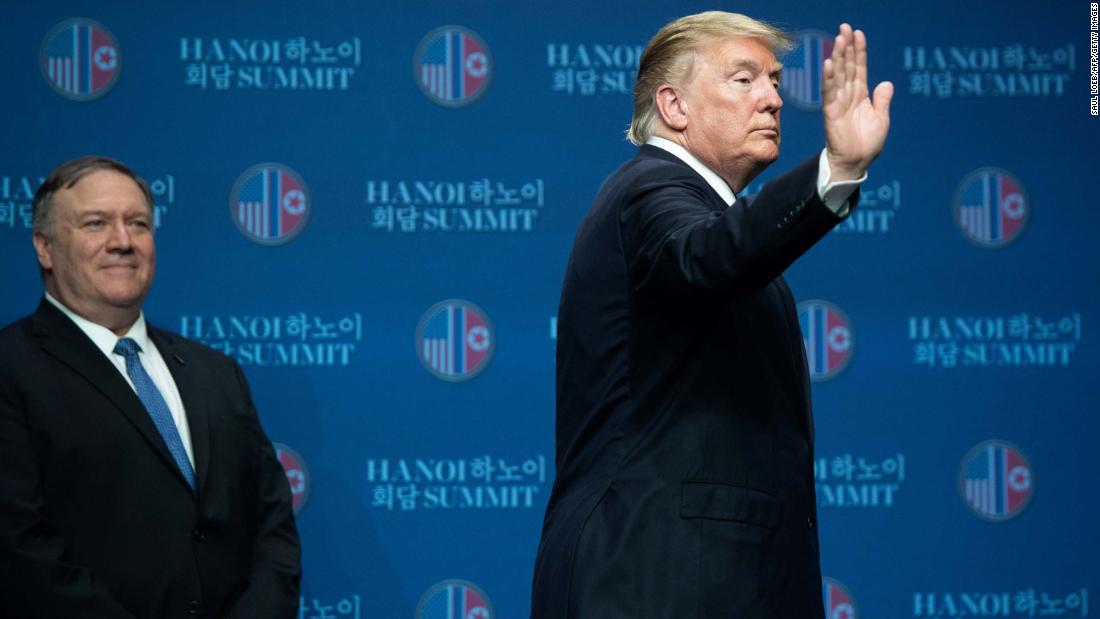
Pyongyang's conduct over the last year and decade should leave no doubt about its intention to retain its nuclear arsenal. Pyongyang has made unreasonable requests for compensation, obfuscated or stonewalled during talks and has continued to expand, conceal, and deploy its arsenal even as they continued. The Hanoi summit failed to disarm North Korea because North Korea won't disarm.
But in another sense, the summit failed because the Trump administration has maintained an inflexible insistence that immediate disarmament is the only acceptable outcome.
When Pyongyang refuses an implausible proposal to hand over a down payment of warheads, the administration goes off in search of the next implausible proposal that might happen to work. Trump is unprepared and unequipped to negotiate an interim deal or to move to another item on the agenda -- because there are no other items on the agenda. Even after the abrupt end of the summit, Secretary of State Mike Pompeo told the press that "we couldn't quite get there today" on Yongbyon, missiles, warheads and a declaration. This delusional insistence that a grand deal is just around the corner does not inspire confidence about the administration has a realistic or achievable plan.
For months, the Trump administration has been ceding ground on its position, abandoning demands that it would not consider modification of US-South Korea military exercises, that no sanctions would be put on the table, that Pyongyang provide a declaration of its nuclear facilities. Now these concessions have brought it to the verge of a reasonable negotiating position but the administration has arrived at this point with little credibility and having wasted an invaluable year.
It is time for a reset of US negotiation policy. Without a decisive shift in tactics, the talks will stagnate and fail, and a third summit will only end like the second.
The next round of negotiations will be harder, not easier. Trump has taught North Korean officials that they can avoid his expert diplomats, send flattering letters, and then placate him at the summit. Unless Trump is able to credibly delegate authority to Special Representative Steve Biegun -- to point to him and say, "When you negotiate with him, you're negotiating with me," he'll walk into and out of a third summit without a deal in hand.
The negotiations remain are an invaluable final chance to limit the North Korean nuclear program. The first priority in negotiations should be to codify and make permanent the limits that Pyongyang adopted voluntarily. Disabling the reactors at Yongbyon until they can be safely and verifiably dismantled is a good first step. An agreement that prevents nuclear tests and certain types of missile tests could provide real limits on the arsenal and enable further negotiations.
Why not, when faced with an impasse on disarmament measures, sign that agreement to maintain momentum through Hanoi? Instead, the president reported that Kim Jong Un had promised to maintain his voluntary moratorium on nuclear and some missile tests.
"I trust him, and I take him at his word," Trump said.
The shift in tactics should start not within the Trump administration but within the US-South Korea alliance. Seoul has developed a series of potential incentives that it can credibly offer in exchange for successive agreements. It was a mistake to allow Pyongyang to divide its negotiations with Washington and Seoul onto two separate tracks. Developing a truly combined negotiating position and, if possible, a combined negotiating team could help to smooth out the volatility of the US administration and provide additional leverage in the talks.
It is unlikely that this President will ever have the discipline, humility and proficiency to successfully conduct the difficult negotiations needed to defend the interests of the United States and its allies against a nuclear-armed North Korea. Yet, if the President empowers the right parts of his team to work with Seoul while he turns his attention to his domestic campaigns and scandals, the opportunity may not go to waste after all.
No comments:
Post a Comment